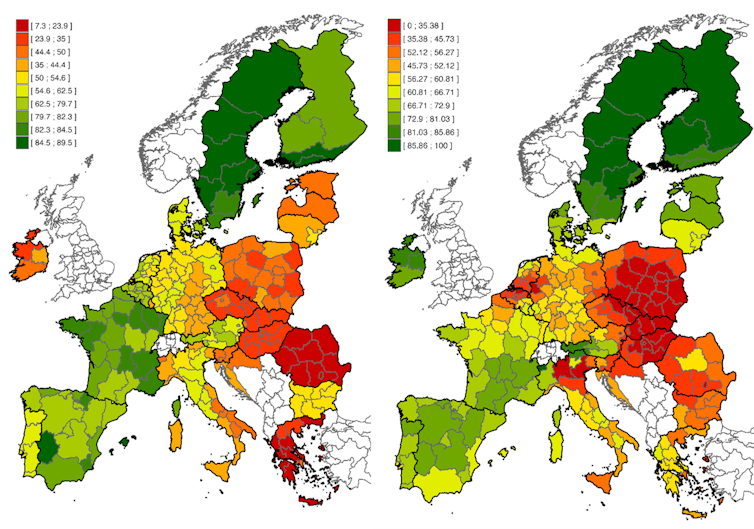Air pollution is one of the main health risks. According to the European Environment Agency (EEA), in 2020, 96% of the urban population in the European Union was exposed to levels of fine particles above the limits recommended by the World Health Organization (WHO). This exposure is estimated to have contributed to more than 238,000 premature deaths and increased healthcare costs due to cardiovascular and respiratory diseases.
At the same time, over the past few decades, women have made significant progress in gaining representation in political decision-making bodies. Between 2003 and 2021, the percentage of women in parliaments and governments in the European Union rose from 24.8% to 34.6% at regional level and from 22.4% to 32.7% at national level, according to the European Institute of Gender Equality (EIGE). This change is crucial in the transformation of political power dynamics in Europe.
Different studies in the field of psychology have detected that women tend to be more sensitive and attach more importance to environmental quality than men. Whether due to historical or cultural factors, having different preferences or the heritage of a society where care work has traditionally fallen to women, if they show stronger pro-environmental values, beliefs and attitudes, a consequence of their greater access to senior political officials could be the adoption of more environmentally friendly policies.
In a recent study, researchers from the Public University of Navarra and the University of Pisa have tried to empirically test whether, indeed, there is a causal relationship between the political presence of women and greater environmental quality in Europe.
Female political presence and pollution
There are already some country-level studies that have examined the relationship between women’s political representation and environmental quality outcomes and policies. In general, these studies find a negative relationship between pollutant emissions and women’s political representation, suggesting that increasing female political empowerment could be a key factor in reducing air pollutants.
In our research, to evaluate the relationship between both factors, we have analyzed data on the presence of women in the political sphere and on air quality from 230 regions in 27 European countries.
On the one hand, we have used the Women’s Political Power Index (WPEI), which measures women’s political participation at different levels of government: local, regional and national.
On the other hand, the data used to measure air quality in European regions comes from the database of the Copernicus Atmospheric Monitoring Service. In this study we consider regional emissions of different local air pollutants such as some reactive gases (carbon monoxide and sulfur dioxide) and aerosols (microscopic suspended particles PM2.5 and PM10).
Considering a regional scale is crucial because, in the European context, environmental and social conditions can vary considerably from one area to another. Furthermore, regional and local authorities are primarily responsible for the implementation of national and supranational environmental directives and standards.
A positive relationship
When analyzing the data we have found that there is a positive relationship in the geographical distribution of the two variables. That is to say, air quality tends to be higher in those regions with a greater presence of women in politics.
Although regional differences within each country are evident, northern Europe presents better results in both indicators, while states such as Poland, Hungary and Romania show lower scores in both political equality and air quality.
In Spain, although there are regional differences, all regions exceed the European average in both aspects.

The authorsCC BY-SA
Causality or coincidence?
In the study we used econometric analysis – which uses statistical and mathematical methods to estimate the magnitude and direction of economic relationships – to determine whether the relationship is causal or simply pure coincidence. The results are robust: in European regions, the greater the political representation of women, the better the air quality.
To ensure the robustness of the results, we also take into account other economic and non-economic factors such as economic development, educational level, innovations in green technologies, political ideology, the level of social awareness about the environment and the density of population. However, the positive relationship between female political participation and air quality remains significant in all analyzes carried out including these factors.
In addition, we use historical data (on female labor market participation and pre-industrial marriage customs) that serve as “instruments” to ensure that the results are reliable and not distorted by possible errors or factors that we have not taken into account.
The study explores three potential indirect pathways through which female political empowerment could influence air pollution levels. The results suggest that the rigor of environmental policies and institutional quality could be responsible for the improvements. However, the analysis does not support that female empowerment influences air quality by generating greater awareness about the possible effects of climate change and environmental pollution.
The results of this study are especially relevant at a time when environmental challenges are more urgent than ever. They suggest that the presence of women in political leadership positions can lead to significant improvements in air quality, through stricter environmental policies and improvements in the quality of government.
Thus, promoting women’s political participation not only contributes to gender equality, but also has a tangible and positive impact on the environment.
